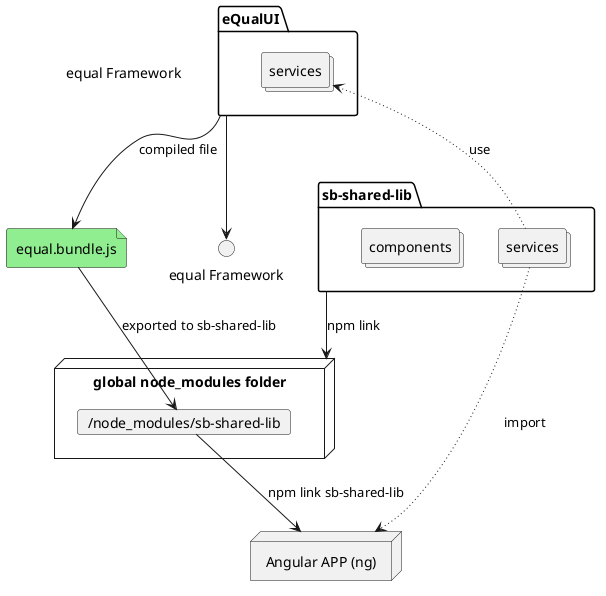Low Code : front-end¶
Overview¶
How frontend libraries work together¶
We have two main libraries that are used in our frontend applications: eQualUI and sb-shared-lib which is provided by symbiose-ui repository.

Overriding apps
It is possible to override an App by using the same ID (will be put as-is in the /public folder: if the target forlder already exists, it is overwritten)
When a custom app extending another app is defined, the related URL is generated using the logic : /app/#/:package/:app_id
Shared-lib¶
When developing custom application in a package of eQual, things can be tough.
For example, it can be hard to know where is the eQual root URL or you may want to use the built-in view renderer of eQual UI.
To make things easier, you can use sb-shared-lib an Angular lib that allow you to access eQual the same way as a native eQual app.
Compiling shared-lib¶
Node version¶
To compile sb-shared-lib you will need to use node 14.18.
If you need to install it aside of another node installation, you may use Node Version Manager as follow :
nvm install 14.18
Build SharedLib¶
Next, you'll need to clone symbioseUI and build it.
git clone https://github.com/yesbabylon/symbiose-ui.git
# you probably need to checkout to dev-2.0 to get newest version of symbioseUI
cd symbiose-ui
git checkout dev-2.0
git pull
npm install
cd sb-shared-lib
npm install
ng build
cd dist/sb-shared-lib
npm link
Once you did this you only need to add equal.bundle.js to the library folder you linked
eQUI (eQual UI)¶
Finaly, you can clone and build eQualUI
git clone https://github.com/equalframework/equal-ui.git
cd equal-ui
npm install
sh export.sh
Using shared-lib in your app¶
Linking sb-shared-lib in the node_modules of your app¶
To use sb-shared-lib, you need to link the library to your project.
In the root of your project directory (regardless to your node version) :
npm link sb-shared-lib
Using shared-lib in Angular¶
When you need to use the library in a Angular module :
import { SharedLibModule } from 'sb-shared-lib';
@NgModule({
declarations: [
],
imports: [
CommonModule,
SharedLibModule,
],
exports: [
],
providers: [
],
})
export class MyAppModule { }
Code Snippets¶
Creating custom API service using ApiService¶
import { ApiService } from 'sb-shared-lib';
@Injectable({
providedIn: 'root'
})
export class CustomApiService {
public cached_schema:any
constructor(
private api: ApiService,
) { }
/**
* Sample function that checks consistency of pkg
*
* @param pkg package to check
*
* @return list of the message about the consistency of the package
*/
public async getPackageConsistency(pkg:string):Promise<string[]> {
var ret = []
try {
ret = await this.api.fetch('?do=test_package-consistency&package='+pkg);
}
catch (response: any) {
// Create a snack with an error message depending on the context and the HttpError instance
this.api.errorFeedback(e)
}
return ret;
}
}
Using EnvService to locate eQual endpoints¶
import { EnvService } from 'sb-shared-lib';
@Component({
selector: 'app-controller-info',
templateUrl: './controller-info.component.html',
styleUrls: ['./controller-info.component.scss'],
encapsulation : ViewEncapsulation.Emulated
})
export class ControllerInfoComponent implements OnInit {
public backend_url:string = "";
public rest_api_url:string = "";
constructor(
private env:EnvService
) { }
async ngOnInit() {
const env = (await this.env.getEnv())
this.backend_url = env["backend_url"]
this.rest_api_url = env["rest_api_url"]
}
}